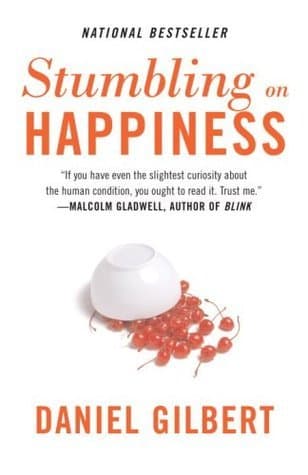
Stumbling on Happiness
by Gilbert, Daniel Todd
Published: May 2, 2006
Read: December 1, 2017
Review
A very important read that has well-supported analysis and conclusions I haven't seen anywhere before. The book is a well-organized exploration of why people misjudge their own future happiness, provides a solution, and then explains why people don't do that. Through the analysis of happiness, you learn some illuminating perspectives and support for the science behind brain analysis and psychology. The author, a Stanford professor, takes a fairly nuisance search of the issue and offers great anecdotes and studies that compel all his conclusions. Definitely, an essential read for anyone interested in happiness and planning their own life. So basically, this is a book for everyone.
Notes
#Book by [[Daniel Gilbert]]
- People who go through cancer are more likely to be optimistic about the future.
- "If you are like most people, which you probably are, you probably think you aren't like most people."
- 96% said they were better than average
- We don't always think we better just unique. We rate ourselves at worst at difficult tasks like chess. Because we like being unique, we have access to our own thoughts, and we focus on differences rather than similarities in life cuz practical.
- [[Frontal Cortex]] is for planning reduces anxiety (lobotomy)
- We think about the future 1/8 of the time cuz we want to take joy in it and affect it.
- Delay reward cuz then you get to look forward to smit.
- [[Freud]], instead of asking what's the [[Meaning of Life]], look to "what men show by their behavior to be the purpose and intention of their lives" to happiness.
- People saw questions and answers and some saw questiins, seeing answers made people say it was more likely they could have guessed answers. We can't set aside experiences and pretend they never happened.
- [[Happiness]] measurements through subjective surveys are all we got
- We re weave memories every time wee remember and as ndetails to any sentence and story.
- We fail to notice what we didn't see which means we fall to notice what or imagination levees out when planning for the future.
- Looking into the future we judge activities based on why and abstractly, but for near future we focus more on the how
- Life hack, decide if you wanna do bad things far in the future and good things short-term
- We confuse emotions of now for imaginated emotions. I.e how's your life depends on the current Westbury depressed people struggle to imagine happiness in the future.
- People detect changes in magnitude, people will drive across town for a free dollars of a small item but not the same for a big one. Think of absolutes. Don't compare prices to what the price was before, compare it to what else you could do with it.
- Experiencing reality would be depressing.
- People believe more in candidates after voting and live their tunings mote after buying them.
- [[Confirmation Bias]], we too good at it. People predict being ljudged negatively by one or a group won't change how they feel, but the single judge rejecting them made them feel better.
- People [[Regret]] things they didn't do more than things they did.
- We change or mind about things that are beyond mildly annoying and irrevocable.
- Given an option to return, we like it less.
- Hate when someone insults your friend more than you.
- Explanations lesden felings and can make you less [[Happy]], secret admirer > regular one.
- Primacy and recency effects on [[Happiness]]. Recall or mood more similarly to our predictions for future than realitu. We reframe, we female we sensitive, we busy voters we defeated at loss.